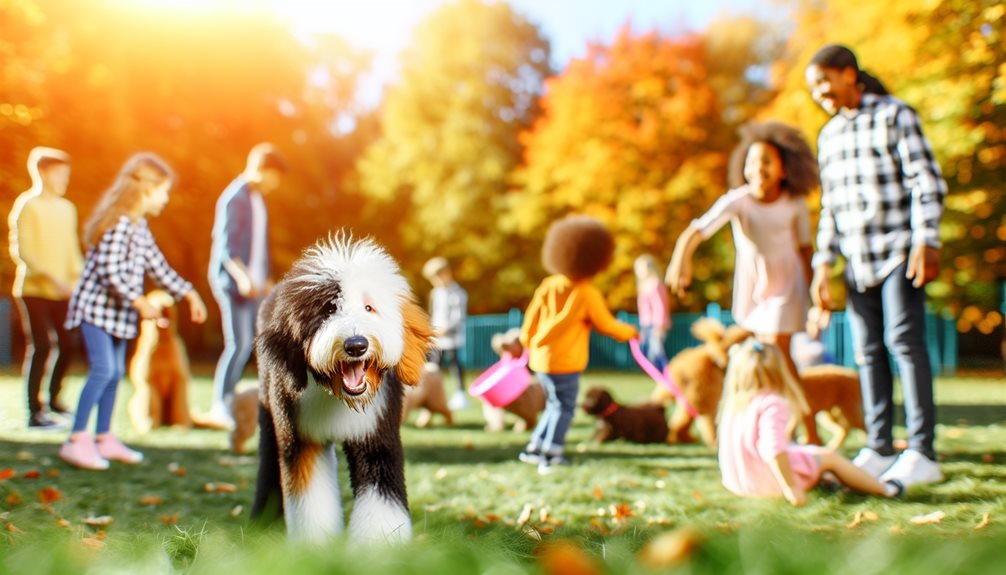Socializing a Bernedoodle puppy involves exposing them to new experiences, people, places, and animals in a way that builds confidence and good behavior. Early socialization is essential for raising a well-adjusted dog that feels comfortable in different environments.
Since Bernedoodles are a crossbreed between a Poodle and a Bernese Mountain Dog, they inherit intelligence, a friendly nature, and sometimes a cautious streak. Poodles are highly trainable but sensitive to harsh corrections, while Bernese Mountain Dogs are affectionate yet may take longer to warm up to new experiences. This mix means Bernedoodles benefit from consistent, positive reinforcement training that balances patience with mental stimulation to keep them engaged and confident.
- Key Takeaways
- Understanding the Importance of Socialization for Your Bernedoodle
- When Should You Start Socializing a Bernedoodle?
- Best Methods for Socialization
- Preventing Separation Anxiety
- Do Bernedoodles Bark a Lot?
- Socialization and Grooming
- Common Mistakes In Socialization
- Frequently Asked Questions:
- Sources
Key Takeaways
✅ Start socializing your Bernedoodle early to build confidence and prevent fear-based behaviors.
✅ Introduce new experiences gradually, including different surfaces, sounds, and people.
✅ Use positive reinforcement like treats and praise to make socialization enjoyable.
✅ Take them to quiet places first, then slowly expose them to busier environments.
✅ Monitor their body language to ensure they feel safe and comfortable.
✅ Keep socialization ongoing throughout their life to maintain good behavior.
Understanding the Importance of Socialization for Your Bernedoodle
Why Is Early Socialization Important for Bernedoodles?
Early socialization is crucial for preventing anxiety, aggression, and behavioral issues according to Research from the American Veterinary Society of Animal Behavior. Professional dog trainers emphasize that puppies exposed to diverse positive experiences between 3 and 14 weeks old develop stronger coping skills in unfamiliar situations.
Lack of early socialization can lead to anxiety, aggression, and behavioral problems. Structured playdates with well-socialized dogs and controlled introductions to busy environments help build confidence in young puppies.

When Should You Start Socializing a Bernedoodle?
The best time to start socializing a Bernedoodle puppy is as soon as they arrive home. Puppies are naturally curious, and early exposure shapes their future confidence.
Puppy socialization classes, visits to parks, and interactions with children and other pets help create a well-balanced dog. Delaying socialization can lead to fearfulness or stubbornness. Early exposure to veterinarians, strangers, and car rides reduces anxiety in these situations.
Best Methods for Socialization

Positive reinforcement is the most effective way to socialize a Bernedoodle. Introducing new sights, sounds, and smells gradually builds trust and confidence.
- Different Surfaces Exposure: Walking on grass, concrete, sand, and wooden floors helps puppies adapt to various environments.
- Leash Training: Helps them feel secure in unfamiliar places.
- Meeting New People: Encourages comfort around strangers and prevents fearfulness.
- Interactive Play: Puzzle toys and playdates improve adaptability and problem-solving skills.
- Clicker Training: Reinforces good behavior while making learning fun.
- Gradual Exposure to Loud Noises: Helps prevent fear of sounds like vacuum cleaners, doorbells, and fireworks.
Preventing Separation Anxiety

Bernedoodles bond strongly with their families and may develop separation anxiety if not accustomed to being alone. Teaching a puppy that alone time is safe prevents stress-related behaviors such as excessive barking or destructive chewing.
- Daily Routine Consistency: Predictability helps build confidence and reduce stress.
- Crate Training: Provides a safe space and comfort when alone.
- Gradual Alone Time: This prevents distress and fosters independence.
- Mental Stimulation: Puzzle toys and activities keep them occupied and reduce anxiety.
Do Bernedoodles Bark a Lot?
Bernedoodles are not excessive barkers, but without proper training, they may bark due to boredom, anxiety, or excitement. Since Poodles are highly alert and Bernese Mountain Dogs can be protective, some Bernedoodles inherit a tendency to bark.
Socialization and consistent training help prevent unnecessary barking. Exposure to different sounds and strangers at a young age minimizes excessive vocalization. Regular exercise and mental stimulation prevent boredom-related barking.
Socialization and Grooming
Bernedoodles have a curly or wavy coat that requires regular grooming. Early exposure to brushing, nail trimming, and bathing helps reduce stress during grooming sessions.
- Professional Grooming Introductions: Familiarizing puppies with professional grooming helps reduce anxiety in the long run.
- Handling Exercises: Daily touching of paws, ears, and tail makes future grooming easier.
- Early Exposure to Grooming Tools: Creates positive associations with brushing and bathing.
- Regular Brushing: Prevents matting and keeps their coat healthy and comfortable.
Common Mistakes In Socialization
Many owners unintentionally make mistakes that lead to anxiety or behavioral problems.
- Forcing Interactions: Can cause fear and resistance.
- Overwhelming Environments: Should be introduced gradually to prevent stress.
- Inconsistent Training: Leads to confusion and slower progress.
- Skipping Key Socialization Periods: The critical socialization window (3-14 weeks) is essential for long-term adaptability.
Patience, consistency, and gradual exposure ensure a successful socialization experience.
Frequently Asked Questions:
Are Bernedoodles easy to train?
Yes, Bernedoodles are highly intelligent and respond well to positive reinforcement. Consistency and rewards help them learn quickly.
What is the best age to start socializing a Bernedoodle?
The best age to start socializing a Bernedoodle is as early as 8 weeks old. Early exposure to new experiences helps them grow into well-adjusted adults.
How can I help my Bernedoodle overcome fear of new environments?
Gradual exposure, positive reinforcement, and allowing your puppy to observe new places from a safe distance before direct interaction can help them gain confidence.
Can Bernedoodles live in apartments?
Yes, Bernedoodles can live in apartments as long as they receive enough exercise and mental stimulation. Regular walks and play sessions are essential.
Do Bernedoodles get along with other pets?
Yes, Bernedoodles are typically friendly with other pets, especially when socialized early. Proper introductions and supervised interactions help ensure a smooth transition.

